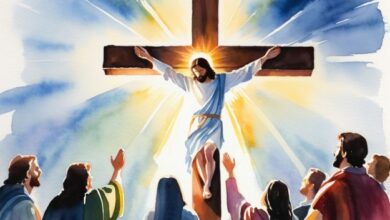Only Jesus Can Quench Our Deepest Thirst

When we encounter Christ Jesus, we will never thirst again.
We are into the third week of Lent and the Holy Roman Catholic Church presents us with another very powerful reading from Sacred Scripture. It is the story of a woman living in sin whose life was changed. That should be the story of all of us – our lives transformed when we encounter Christ Jesus. In this story, almost every line tells a story in itself. So as we journey through Lent, let us look at some of the things this passage is saying to us.
Jesus had walked a long journey, no doubt through very dry and arid land. Tired from the journey, Jesus sat down by the well. It was about the sixth hour. To understand what time of day it was, we must understand how the time of day was measured in Jesus’ time. They would measure the hours by the number of hours of daylight; for them, daylight started at 6am. So when the bible tells us it was at the 6th hour, it is telling us that it was 6 hours after 6am – which is at midday, the hottest time of the day when the sun is directly overhead.
So Jesus was tired and he sat down by the well. Now since he was on a journey from one place to another, chances are Jesus did not have a bucket or anything like that to drip water. So he sat there waiting for someone to come by who would have had a bucket. Or was that the real or the only reason that Jesus was there? Maybe it was that Jesus knew that this woman who had been condemned by Society, who had been condemned because of her sins, and who’s desire it was to be free; Jesus knew that she came by the well when she least expected anyone to be there so that she would not be seen by anyone for God alone knew the shame and the pain she must have felt from her life of sin. So he made himself available so that she could encounter truth, so that she could encounter true freedom, so that she could encounter liberation from sin. So the first point here is that Jesus meets us where we are. Jesus is always seeking ways to bring us to an encounter of his mercy. So whatever each stage of your life or the state of your soul know that Christ Jesus is seeking ways for you to come into his presence.
So the Samaritan woman comes to the well and she sees Jesus there. It must have taken her by surprise. More so, when Jesus spoke to her and asked her for something to drink. The surprise would have been well-founded, since Jews had no dealing with Samaritans. Jews considered Samaritans as dogs. So this second point that this beautiful story teaches us is that Jesus is all about Unity. Jesus breaks down barriers. God’s love is for all. Salvation is for all. God’s mercy is for all. So absolutely no one is exempt from God’s love and his Mercy regardless of ethnicity, regardless of status in society; regardless of color, regardless of creed, regardless of class. God’s mercy and his Plan of Salvation is for all.
Another aspect of this is that very often Christians can be very hard on other persons seeking to enter into the church. We can be very critical especially if we may know the person’s past. We tend to want to hold it against them and to condemn them. “Who she think she playing?” “Look at he, the old drunk. Now coming to play holier-than-thou.” But the word of God tells us, “do not judge, and you will not be judged, because the judgment you give are the judgment you will get, and the standard you use will be the standard used for you. (Matthew 7: 1 – 2)
So the dialogue continues between Jesus and this Samaritan woman. It started with Jesus asking her for a drink of water and we are at the stage where Jesus in a gentle way, confronts her sin. What the woman does next is critical for conversion and for the experience of true freedom – she does not become defensive, she does not become aggressive and she does not deny the truth nor make excuses for it.
Many people right here in Trinidad and Tobago are living in the darkness of sin and the denial of that sin. Many mothers and fathers know very well that their sons are bandits, and they live in denial. Many mothers and fathers know that their sons are not working anywhere- legitimately that is – but they have expensive gold chains around their necks, “bess” clothes, and they have car. That is denial of sin that leads to condemnation. They know that their daughter is not working, yet she always has the best bling. Many women know that the man they are with is not good for them. He beating them and they know the man is wanted by the law, yet they continue to deny that all is not well. In their prison, he providing for them. They getting blows in the process, “buh wah ah go do? Ah do ha no weh to go.” What a sad state to be living in! How tragic!
If you want to move on to a better, peaceful and more fulfilling life; one where you won’t have to be looking constantly over your shoulders; one where your conscience is clear, then you must call a jack a jack and a spade a spade. You must confront sin for what it really is – sin, and offensive to Almighty God! Otherwise, as the saying goes, you’ll be just spinning top in mud.
As the conversation continued with this Samaritan woman, it was quite clear that she knew of the Messiah. She said, “I know that Messiah is coming (he who is called the Christ); and when he comes he will show us all things.” So she knew of the Messiah. Little did she know that the Messiah was standing right in front of her.
Then Jesus said to her, “I who speak to you, am he.” One can imagine the drama that must have ensued thereafter. The Samaritan woman must have had a long hard stare at Jesus when he said these words. Maybe she hung her head; maybe she fell to her knees, maybe she became all teary-eyed. One can only imagine the thoughts that must have flooded her mind and the emotions she must have felt.
It is very possible that if this Samaritan woman had not acknowledged her sinfulness, but had rather gone into denial when Jesus asked her about her husband, she would never have been able to see nor experience Jesus for who he really is; Mercy. Sin, blocks and prevents us from seeing and experiencing the love of God made visible in Christ Jesus. Because this Samaritan woman acknowledged her sins, she was able to come into an encounter with the living Christ and to experience his Mercy.
One of the very powerful lines in this story is verse 28 – 29 where it says, So the woman left her water jar, and went away into the City and said to the people, “come and see a man who has told me all that I ever did. Can he be the Christ?”
Hold on a minute here! Isn’t this the same Samaritan woman who would hang her head in shame because of the life she was living; who would go to fetch water from the well when it was hottest because she knew no one would be there, no one to feel a sense of embarrassment? Yes! It is the same woman! That is what an encounter with God’s mercy does.
The woman leaving the water jar behind is a symbol of her walking away from her sins. She encountered the mercy of Christ after acknowledging her sinfulness, and she left his presence a free woman, no longer afraid or ashamed of the life she once lived. In fact, full of excitement, she exclaimed to the people of the town, “come and see a man who told me all I ever did!”
Many of us tote our sins around as if they were pets. This encounter between the Samaritan woman and Jesus, is the encounter that all of us should have when we go to confession. Unfortunately many of us, if we do go to confession, we leave our pet sins tied outside the confessional, only to pick them back up again when we leave, never really experiencing the freedom and the beauty of God’s mercy.
This Samaritan woman encountered God’s mercy. As a result of that encounter, her life was so transformed that she moved from being sinner to evangelist. The story ends in a dramatic way by saying that many Samaritans from that town believed in Jesus because of the woman’s testimony. I must add here that this is the same Samaritan woman whose word prior to this probably had absolutely no weight whatsoever. However as a result of her encounter with Christ, she was set free.
The power of her conversion experience gets even better. Many Samaritans not only came to believe in Jesus on account of the woman’s testimony, but they also came to Jesus and asked him to stay with them. So here we have a town full of people who never knew the Messiah, but only knew of him, coming to believe in the Messiah and then asking him to stay with them; to come into their lives.
This Samaritan woman outlines the making of a saint. Many, many of our saints were in fact sinners and great sinners at that, who encountered God’s mercy in Christ Jesus, and their lives were transformed as the song says, to the full extreme!
The story of the woman at the well can be yours and my story too. Jesus is constantly seeking after us, the lost sheep, not so that he can condemn and punish us, but rather so that we can experience his love and mercy. The wages of sin is death, but the free gift of God is eternal life in Christ Jesus our Lord. Let us ask God to grant us the grace to thirst for him and for him alone. Let us ask him for the grace to hunger and thirst for righteousness and for holiness, and not for the things of this world. Let us ask him for the grace to turn away from our sins, so that we will no longer be slaves to sin and to our worldly passions; but rather that we would be slaves to righteousness.






